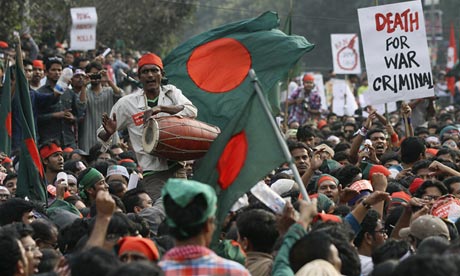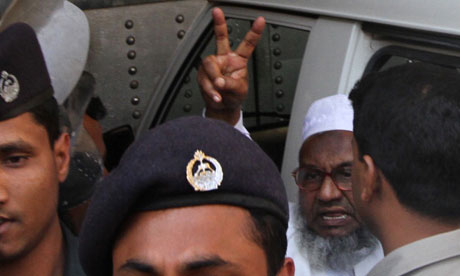 ?By Tahmina Anam, Guardian
?By Tahmina Anam, Guardian
Abdul Quader Mollah has finally been convicted of war crimes committed in Bangladesh in 1971. Now a huge popular protest in Dhaka’s Shahbag district is demanding the death penalty.

The Shahbag protesters resemble a jubilant flash-mob. Photograph: AFP/Getty Images
It all began with a victory sign. When Abdul Quader Mollah, assistant secretary-general of?Bangladesh‘s?Jamaat-e-Islami?party, emerged from the supreme court on the afternoon of Tuesday 4?February, he turned to the press waiting outside, smiled, and made a victory sign. An odd reaction for a man just sentenced to life in prison.
Mollah smiled because for him, a man convicted of beheading a poet, raping an 11-year-old girl and shooting 344 people during the?1971 Bangladesh war of independence?? charges that have earned him the nickname the Butcher of Mirpur ??the life sentence came as a surprise. Earlier this month, a fellow accused, Abul Kalam Azad, who is reputed to have fled to?Pakistan,?was sentenced to death in absentia.
When Mollah emerged from the courthouse, a group of online activists and bloggers assembled to?protest?against the verdict, demanding that Mollah, like Azad, be given the death sentence. They set up camp in Shahbag, an intersection at the heart of Dhaka, near the university campus, and staged a small sit-in. They collected a few donations and ordered?khichuri?(a mixture of rice and lentils) to keep them going through the night. Word spread on Facebook and Twitter. The next day, a few news channels began covering their protest. By the end of the week, they had managed to put together the biggest mass demonstration the country has seen in?20 years.
The movement ? centred around Shahbag, which some have renamed?Projonmo Chottor?(New Generation Roundabout) ? shows no sign of abating. It reached its peak on Friday, when the organisers called a grand rally. Numbers vary, but are estimated to have been anywhere from 100,000 to 500,000. Traffic in the city, already notoriously slow, ground to a halt. Because it was a weekend, many people brought their children, their faces painted in the red and green of the Bangladeshi flag. The mood was like that of a fairground, with vendors selling fried snacks and spicy puffed rice; small groups within the throng sat in circles, singing, reciting poems and playing guitars. A tailor set up his sewing machine, making replicas of the national flag for people to wear around their heads. A play was staged at one end of the roundabout.
Unfortunately youtube is still blocked in Bangladesh and you might not be able to view the video: ?www.youtube.com/watch?v=4v75XGOyryw
For people like me who are opposed to capital punishment, Shahbag has posed an uncomfortable question: can a movement that began with a call for the death penalty, with cries of?Fashi Chai! Fashi Chai!?(Let him hang!) go beyond a simple baying for blood?
But the call for Mollah’s death is about more than revenge. He committed his crimes during Bangladesh’s nine-month struggle for independence from Pakistan in 1971. Mollah and the 11 others who stand trial with him ? 10 of whom are members of Jamaat-e-Islami ? are accused of collaborating in war crimes with the Pakistani army. Between March and December of that year, the Pakistani army unleashed a campaign of mass murder against Bangladeshi civilians. War crimes were ubiquitous in 1971 ? as is evidenced by the discovery of mass graves throughout the country, Pakistani documents detailing operations and massacres, hit-lists of local collaborators, journalists’ reports, photographs and video footage, and, most importantly, the eyewitness accounts of the survivors.
Since Bangladesh’s independence, the state had done little to bring people such as Mollah to justice. The erasure of the war began in 1972 with the granting of amnesty to the Pakistani army officers who led the killings. During the decades of political turmoil that followed in Bangladesh, the war, and its crimes, were buried, while one regime after another contributed to the rehabilitation of the Jamaat party. Internationally, charges of genocide were never formally brought to the United Nations. The world quickly forgot the Bangladesh war.
That is why Mollah flashed his victory sign outside the courthouse. because, for the first 40 years of independent Bangladesh, no government had sought to try him; because he, along with the rest of his party, were courted by politicians at home and abroad. His fellow party leaders were elected to parliament and made ministers. None of them ever thought they would appear in court. One of Mollah’s fellow accused is rumoured to have regularly announced in public: “I am a?Razakar!” (war criminal).
The tide finally turned in 2008, when the Awami League (the party whose then leader, Sheikh Mujibur Rahman, had led the independence movement) won a landslide victory at the general election. The campaign included a promise to set up a tribunal to prosecute those who had committed war crimes in 1971. The International Crimes Tribunal was set up in 2010. Since then, the court has been gathering evidence and hearing testimonies against the accused.
Because the trial has been so long in the making, the verdicts are watched by millions of people waiting anxiously to see if their families will finally get justice. And for them, after 42 years, a life sentence for a man convicted of mass murder, arson and rape was not punishment enough.

Abdul Quader Mollah offers a victory salute after being convicted of war crimes in Dhaka. Photograph: STRDEL/AFP/Getty Images
In addition to the perceived inadequacy of the sentence is an abiding anxiety about the way it will be carried out. It is ingrained in the public imagination that justice always takes second place to political expediency. Mollah knows that if his party or its allies were to come to power again, he would almost certainly be freed. That is why the protesters at Shahbag are calling for his death: it is the only way they can be sure the episode will come to an end.
In Shahbag, the organisers have refused to allow political parties to take the stage. Instead, freedom fighters and activists are invited to speak. Zafar Iqbal, a beloved children’s writer and columnist, arrived on stage mid-afternoon on Friday. The first thing he did was ask for the crowd’s forgiveness. “I?have complained about your generation, saying that all you do is go on the internet and check your Facebook. I?said that you would never come on to the streets. I am so happy to have been proven wrong today.” A few days later,?the Bangladesh cricket team turned up?to show their support. With the chanting and singing spreading across the grounds, the protesters of Shahbag often resemble a jubilant flash-mob.
Shahbag is unique for Bangladesh on two important fronts. First is?the prevalence and visibility of women, who are among the core organisers. Unlike in many public spaces in Bangladesh, women have been highly visible. They frequently take the microphone to lead the crowd in chanting. Second is the movement’s use of social networking on Facebook and?Twitter, and dependence on the 24-hour satellite news channels that have been covering the protest since the first day.
In the days leading up to the Mollah verdict, the Jamaat party called a succession of?hartals?(strikes), in an attempt to?bring the country to a standstill. Activists burned cars and clashed with police. Four innocent people died in the crossfire. Now the Shahbag demonstrators are calling for an end to Jamaat and its student wing, Shibir. Though the Jamaat party only won two out of 300 seats in the last election, their presence as a powerful third party in politics has remained unquestioned ? until now. There is a sense of a shifting political landscape: the people keeping vigil at Shahbag are young, possibly undecided voters?who are looking for leaders. Who knows what this means for the old guard?
The next few weeks will be crucial for the Shahbag movement. There is fear, and there is hope. Fear that the protest will be co-opted by greater political forces; that violence will erupt and women will no longer be safe; that the cries for Mollah’s hanging will overpower all other forms of resistance, and anyone who disagrees will be branded a traitor. But there is hope, too: that the protest will become a movement for a fair trial, and for a final, definitive and unbiased account of what happened in 1971; for the strengthening of secular, progressive politics in?Bangladesh.
? Tahmima Anam is the author of ?The Good Muslim?(Canongate).
Mollah smiled because for him, a man convicted of beheading a poet, raping an 11-year-old girl and shooting 344 people during the?1971 Bangladesh war of independence?? charges that have earned him the nickname the Butcher of Mirpur ??the life sentence came as a surprise. Earlier this month, a fellow accused, Abul Kalam Azad, who is reputed to have fled to?Pakistan,?was sentenced to death in absentia.
When Mollah emerged from the courthouse, a group of online activists and bloggers assembled to?protest?against the verdict, demanding that Mollah, like Azad, be given the death sentence. They set up camp in Shahbag, an intersection at the heart of Dhaka, near the university campus, and staged a small sit-in. They collected a few donations and ordered?khichuri?(a mixture of rice and lentils) to keep them going through the night. Word spread on Facebook and Twitter. The next day, a few news channels began covering their protest. By the end of the week, they had managed to put together the biggest mass demonstration the country has seen in?20 years.
The movement ? centred around Shahbag, which some have renamed?Projonmo Chottor?(New Generation Roundabout) ? shows no sign of abating. It reached its peak on Friday, when the organisers called a grand rally. Numbers vary, but are estimated to have been anywhere from 100,000 to 500,000. Traffic in the city, already notoriously slow, ground to a halt. Because it was a weekend, many people brought their children, their faces painted in the red and green of the Bangladeshi flag. The mood was like that of a fairground, with vendors selling fried snacks and spicy puffed rice; small groups within the throng sat in circles, singing, reciting poems and playing guitars. A tailor set up his sewing machine, making replicas of the national flag for people to wear around their heads. A play was staged at one end of the roundabout.
Unfortunately youtube is still blocked in Bangladesh and you might not be able to view the video: ?www.youtube.com/watch?v=4v75XGOyryw
For people like me who are opposed to capital punishment, Shahbag has posed an uncomfortable question: can a movement that began with a call for the death penalty, with cries of?Fashi Chai! Fashi Chai!?(Let him hang!) go beyond a simple baying for blood?
But the call for Mollah’s death is about more than revenge. He committed his crimes during Bangladesh’s nine-month struggle for independence from Pakistan in 1971. Mollah and the 11 others who stand trial with him ? 10 of whom are members of Jamaat-e-Islami ? are accused of collaborating in war crimes with the Pakistani army. Between March and December of that year, the Pakistani army unleashed a campaign of mass murder against Bangladeshi civilians. War crimes were ubiquitous in 1971 ? as is evidenced by the discovery of mass graves throughout the country, Pakistani documents detailing operations and massacres, hit-lists of local collaborators, journalists’ reports, photographs and video footage, and, most importantly, the eyewitness accounts of the survivors.
Since Bangladesh’s independence, the state had done little to bring people such as Mollah to justice. The erasure of the war began in 1972 with the granting of amnesty to the Pakistani army officers who led the killings. During the decades of political turmoil that followed in Bangladesh, the war, and its crimes, were buried, while one regime after another contributed to the rehabilitation of the Jamaat party. Internationally, charges of genocide were never formally brought to the United Nations. The world quickly forgot the Bangladesh war.
That is why Mollah flashed his victory sign outside the courthouse. because, for the first 40 years of independent Bangladesh, no government had sought to try him; because he, along with the rest of his party, were courted by politicians at home and abroad. His fellow party leaders were elected to parliament and made ministers. None of them ever thought they would appear in court. One of Mollah’s fellow accused is rumoured to have regularly announced in public: “I am a?Razakar!” (war criminal).
The tide finally turned in 2008, when the Awami League (the party whose then leader, Sheikh Mujibur Rahman, had led the independence movement) won a landslide victory at the general election. The campaign included a promise to set up a tribunal to prosecute those who had committed war crimes in 1971. The International Crimes Tribunal was set up in 2010. Since then, the court has been gathering evidence and hearing testimonies against the accused.
Because the trial has been so long in the making, the verdicts are watched by millions of people waiting anxiously to see if their families will finally get justice. And for them, after 42 years, a life sentence for a man convicted of mass murder, arson and rape was not punishment enough.

Abdul Quader Mollah offers a victory salute after being convicted of war crimes in Dhaka. Photograph: STRDEL/AFP/Getty Images
In addition to the perceived inadequacy of the sentence is an abiding anxiety about the way it will be carried out. It is ingrained in the public imagination that justice always takes second place to political expediency. Mollah knows that if his party or its allies were to come to power again, he would almost certainly be freed. That is why the protesters at Shahbag are calling for his death: it is the only way they can be sure the episode will come to an end.
In Shahbag, the organisers have refused to allow political parties to take the stage. Instead, freedom fighters and activists are invited to speak. Zafar Iqbal, a beloved children’s writer and columnist, arrived on stage mid-afternoon on Friday. The first thing he did was ask for the crowd’s forgiveness. “I?have complained about your generation, saying that all you do is go on the internet and check your Facebook. I?said that you would never come on to the streets. I am so happy to have been proven wrong today.” A few days later,?the Bangladesh cricket team turned up?to show their support. With the chanting and singing spreading across the grounds, the protesters of Shahbag often resemble a jubilant flash-mob.
Shahbag is unique for Bangladesh on two important fronts. First is?the prevalence and visibility of women, who are among the core organisers. Unlike in many public spaces in Bangladesh, women have been highly visible. They frequently take the microphone to lead the crowd in chanting. Second is the movement’s use of social networking on Facebook and?Twitter, and dependence on the 24-hour satellite news channels that have been covering the protest since the first day.
In the days leading up to the Mollah verdict, the Jamaat party called a succession of?hartals?(strikes), in an attempt to?bring the country to a standstill. Activists burned cars and clashed with police. Four innocent people died in the crossfire. Now the Shahbag demonstrators are calling for an end to Jamaat and its student wing, Shibir. Though the Jamaat party only won two out of 300 seats in the last election, their presence as a powerful third party in politics has remained unquestioned ? until now. There is a sense of a shifting political landscape: the people keeping vigil at Shahbag are young, possibly undecided voters?who are looking for leaders. Who knows what this means for the old guard?
The next few weeks will be crucial for the Shahbag movement. There is fear, and there is hope. Fear that the protest will be co-opted by greater political forces; that violence will erupt and women will no longer be safe; that the cries for Mollah’s hanging will overpower all other forms of resistance, and anyone who disagrees will be branded a traitor. But there is hope, too: that the protest will become a movement for a fair trial, and for a final, definitive and unbiased account of what happened in 1971; for the strengthening of secular, progressive politics in?Bangladesh.
? Tahmima Anam is the author of ?The Good Muslim?(Canongate).
